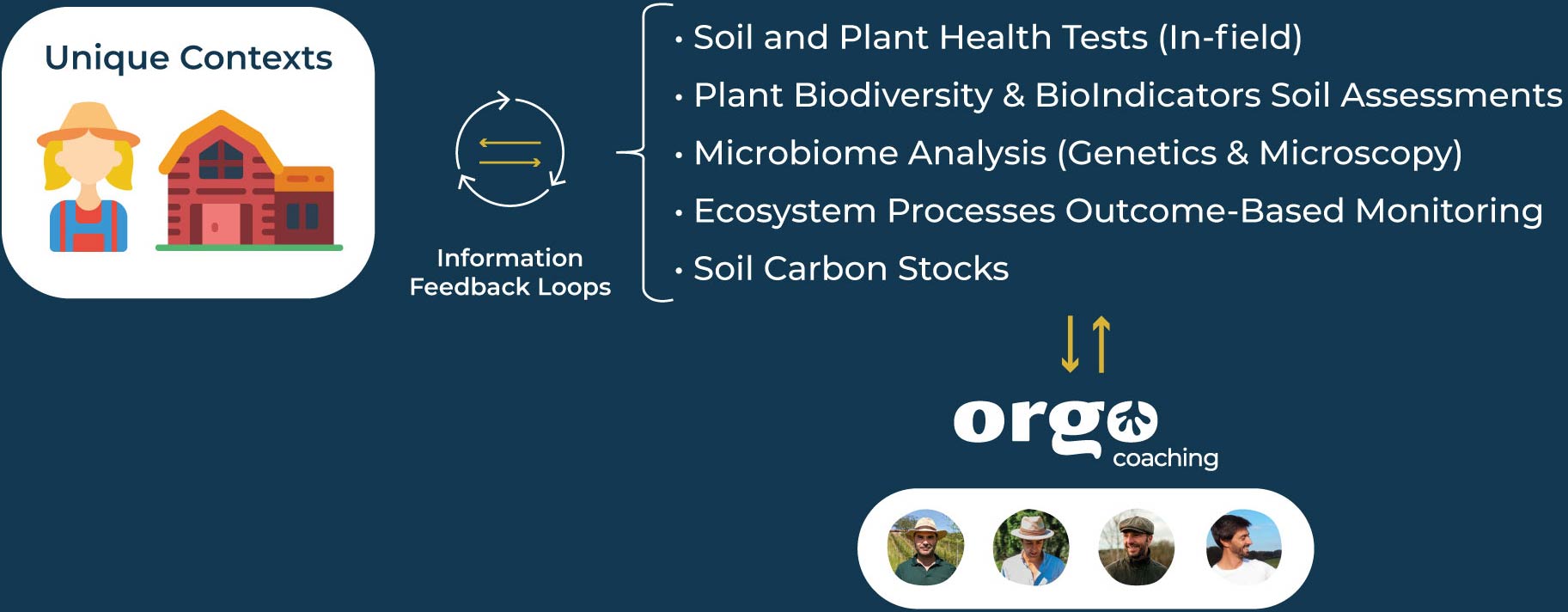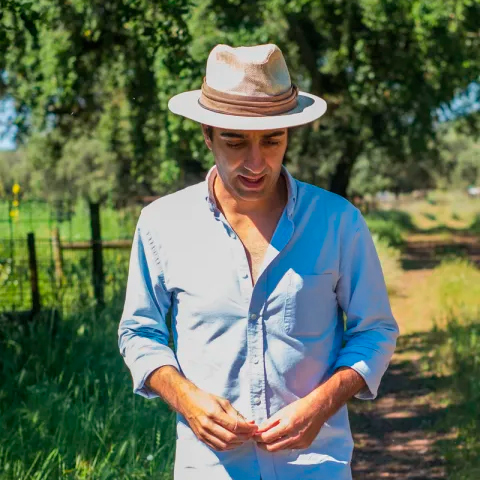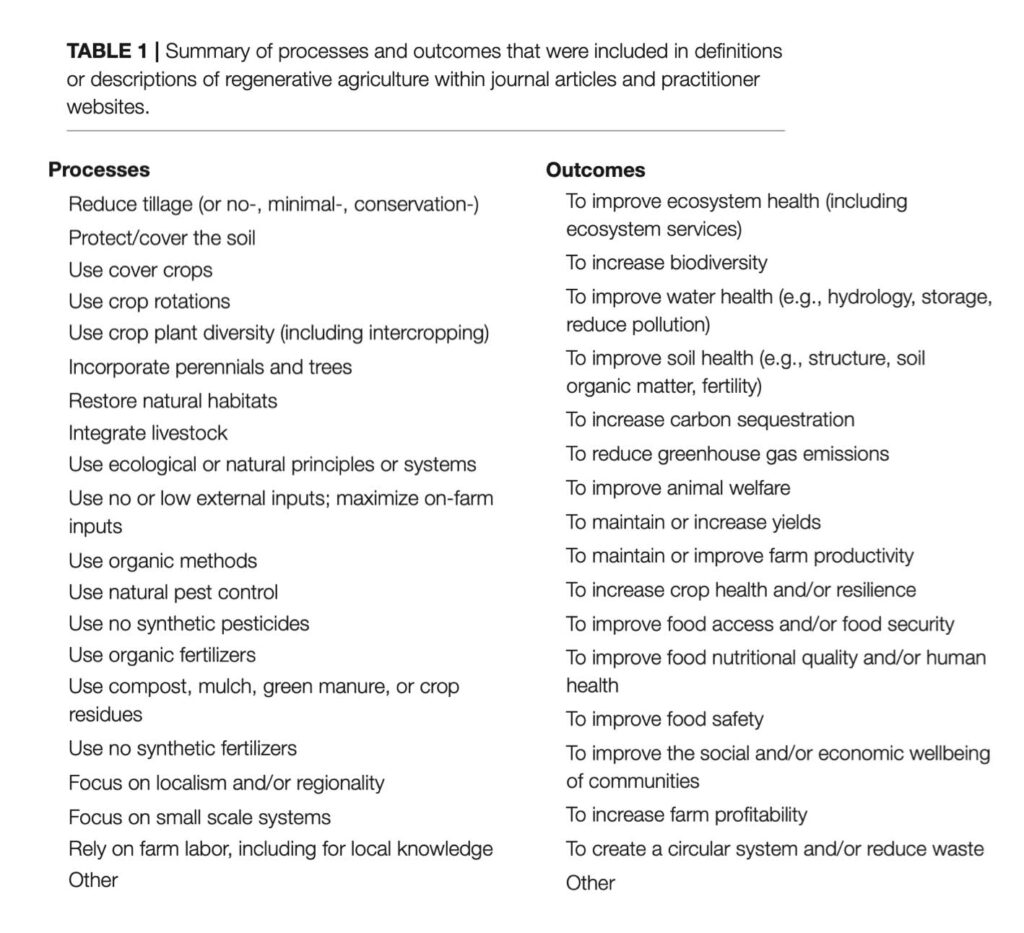
We believe the main drivers to scale Regenerative Agriculture are:
Experiences and know-how exchanges between similar contexts.
Successful regenerative farms support neighboring farms transitions.
Focus on growing Quality, this leads to higher food nutrient-density, flavour, yields and land resilience. Opening new premium markets possibilities.
Farmer-to-Farmer Coaching: in-person & online/remote programs; farms visits
Interpretations & Recomendations: Plant Sap Analysis, Microbiology Analysis, Mix Cover Crops
Technical Trainings 1-to-1 & Workshops: Grazing (AMP), Plant Nutrition, Composts, Ferments, Extracts, Field-Application Methods
On-Boarding Ecosystem Benefits/Biodiversity Credits Program (soon)
Support adoption New CAP 2023-27
1 min form

Orgo provides a specially selected group of in-field monitoring tests and microbial analyses to empower you with practical information about your agro-ecosystem health, focusing on regenerating life above and below ground.
1 min form
We believe education plays a crucial role on empowering the current and next generations leading us to a more regenerative society.
1 min form





“Regenerative Agriculture is a system of farming principles and practices that increases biodiversity, enriches soils, improves watersheds, and enhances ecosystem services. It aims to capture carbon in the soil and above-ground biomass (plants), reversing current global trends of atmospheric accumulation of CO2 causing climate change. At the same time, it offers increased yields, resilience to climate instability, and higher health and vitality for farming communities.”
Terra Genesis International

Full report stating the economical, social and environmental benefits of investing in agro-ecological/regenerative systems by SLM Partners: here
&
Boston Consulting Group (BCG) - The Case for Regenerative
Agriculture in Germany—
and Beyond: summary & study
We are a member of the Restor Global restoration Network and are committed to science-based best restoration practices. Orgo is already participating in the platform managing restoration sites.
#WeRestor
#GenerationRestoration

Born and raised in a family of several generations of farmers, Sérgio studied agronomy and worked as a winegrower and consultant on several projects in various regions of Portugal.
In 2018, Sérgio started a new personal project with the family’s vineyards to produce organically certified grapes and wines.
In their project, they farm based on the principles and practices of Regenerative Agriculture, which aims to increase the health of plants and soil working with the full ecosystem as a holistic system.
The outcome of these practices is a product that is, not only more nutritionally balanced, but also richer in aromas and flavours which fully expresses its unique terroir at the same time that restores ecosystem processes and increases life biodiversity.
Speaks: Portuguese, English and Spanish
Since 2005 that Francisco is the farm manager of his family farm in Montemor (Portugal) where he grew up and from a very early age he realized that this was what he wanted to do for a living.
The name Porcus Natura comes from the unique system of maternity wards developed by his Father in 2002, where the main focus was already animal welfare and soil regeneration.
After decades in conventional management, where they have always been careful with soil management (e.g. never using pesticides or tilling), it was a natural transition for them to adapt their management to the principles of regenerative agriculture in their ancient Portuguese agro-silvo-pastoral Montado landscape.
This regenerative journey started in 2017 when he took several courses in holistic management and regenerative agriculture, after which they started applying the principles and practices in the field, even introducing two more species to the ones already on the farm. Currently, Francisco produces and sells four species of Portuguese indigenous breeds of sheep, goats, cattle and pigs.
Creating a rotational grazing dynamic with the four different animal species, with the objective of making the business more efficient as well as regenerating the Montado ecosystem, is Francisco’s main focus thus obtaining meat products with a positive impact on the environment and human health.
Speaks: Portuguese, English and Spanish
João was born in Castelo Branco (Portugal), he studied farming management in Lisbon and soon after finishing his studies he returned to his roots and to his family farm.
His family farm started the transition to organic already in the year 1999, leaving conventional intensive monoculture productions behind. Observing the immediate response of the ecosystem to the new practices, they realized that this was the right way.
After a work trip to New Zealand, João had his first contact with regenerative agriculture and they realized, without knowing it, they were already using some principles of Regenerative Agriculture.
João manages around 1000ha with a wide range of (bio)diversity. The farm includes agro-silvo-pastoral Montado landscape, olive groves, cereals and legumes. Animals are also part of the system using adaptive-multi paddock grazing rotations focusing on plant and soil health.
João’s farm goal is always to recover, care for and understand the ecosystem as a whole respecting the principles of soil health.
Speaks: Portuguese, English and Spanish
Francisco grew up in close connection with nature and animals during his childhood spent on his family farms in Alentejo (Portugal). This passion for nature, animals and global environmental fragility led him to study forest engineering and later to pursue a career in the field of biofuels, both on the research and business sides. Only a few years ago, after an aha moment about soil and regenerative agriculture, he decided to dedicate his life to regenerating agro-ecosystems.
Francisco works as a researcher and innovation manager in the regenerative agriculture on-farm research project KUHproKLIMA (Cow for the Climate) in Germany. His main research work aims to bridge the gap between science and practice. He works directly with farmers to create cost-effective solutions for practical farming challenges with a special focus on soil and plant health monitoring, microbiology analysis, composts/ferments and liquid extracts applications.
In Portugal, he is now also co-managing the conversion to regenerative organic of his family’s olive tree groves in the Avis region.
Francisco holds a BSc. Forest and Natural Resources Engineering (ISA-UL) and a MSc. Energy and Bioenergy (FCT-UNL). He is a Certified Lab Technician by Dr. Elaine Ingham’s Soil Food Web. His professional and personal interests led him to work with international and diverse teams in several countries like Malaysia, Australia, Netherlands, Germany and Portugal.
Speaks: Portuguese, English, Spanish and basic German.

